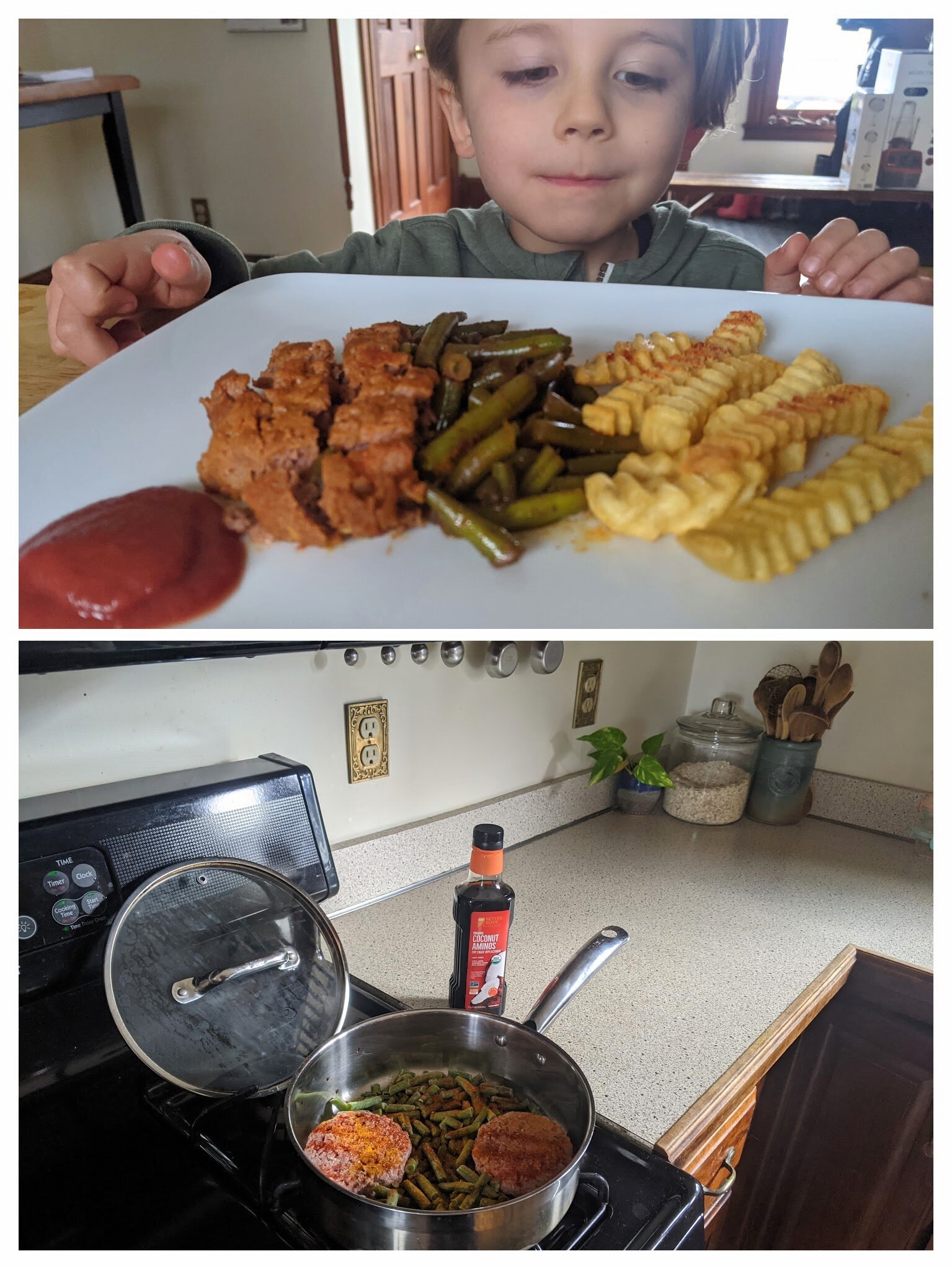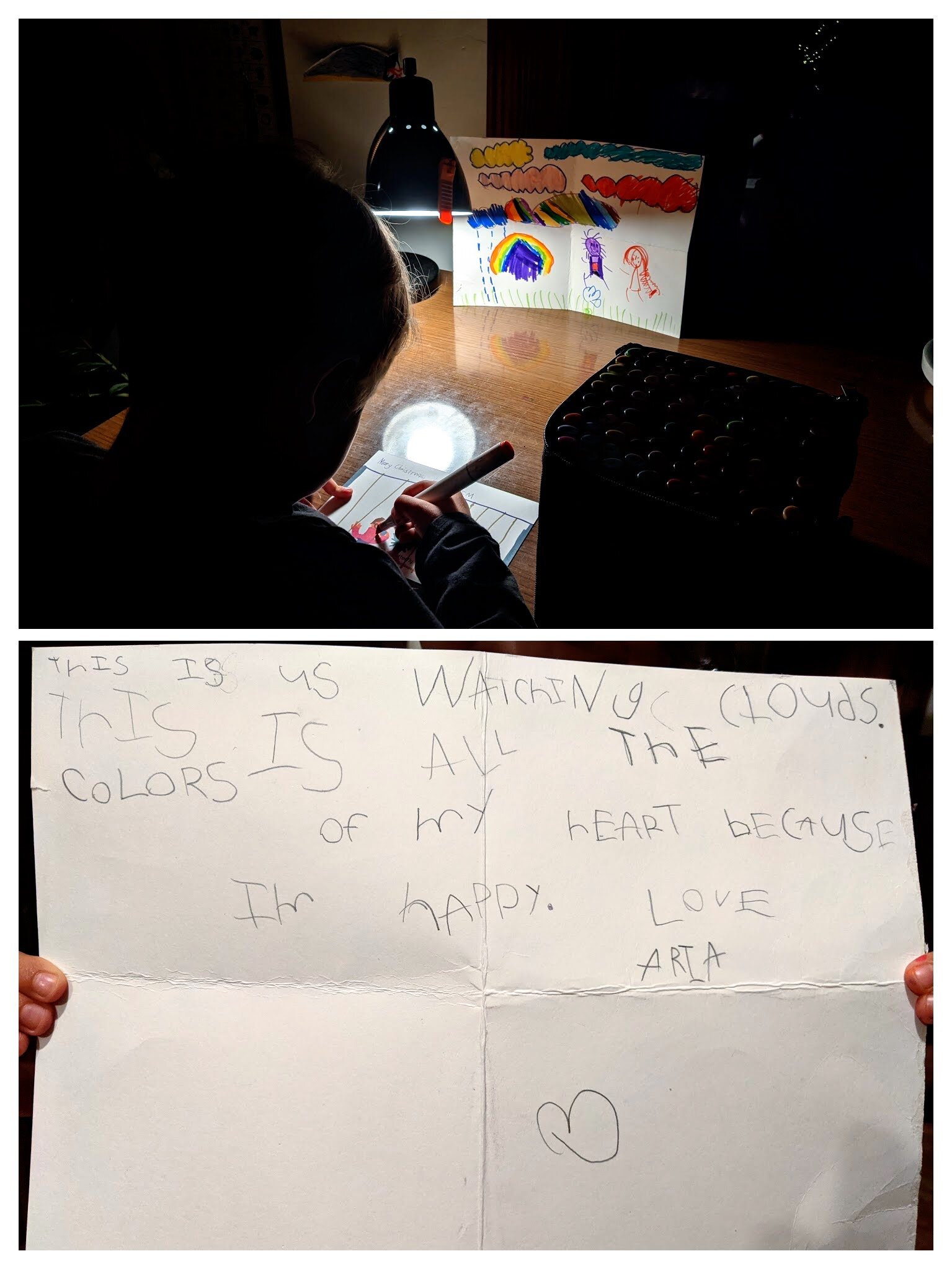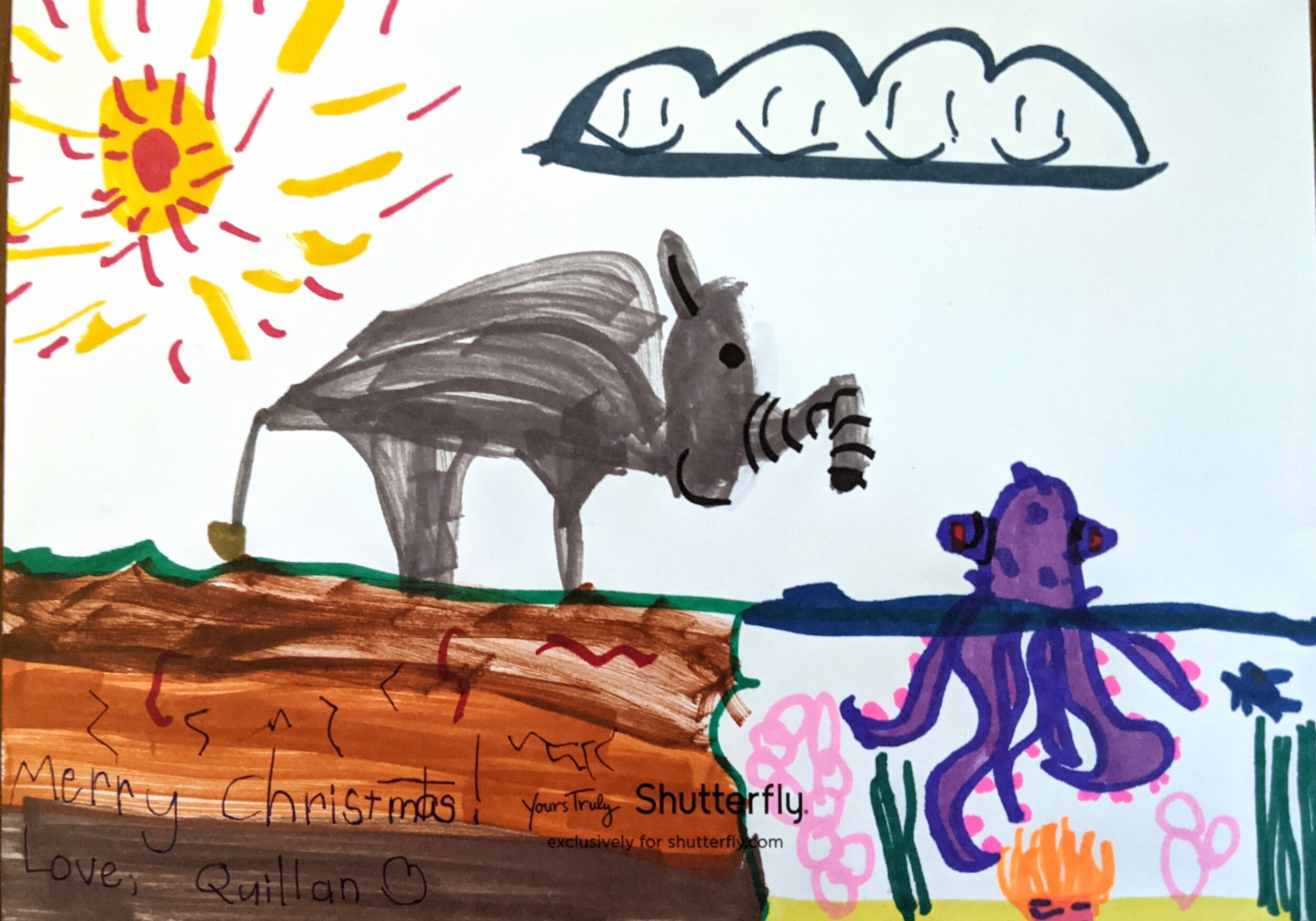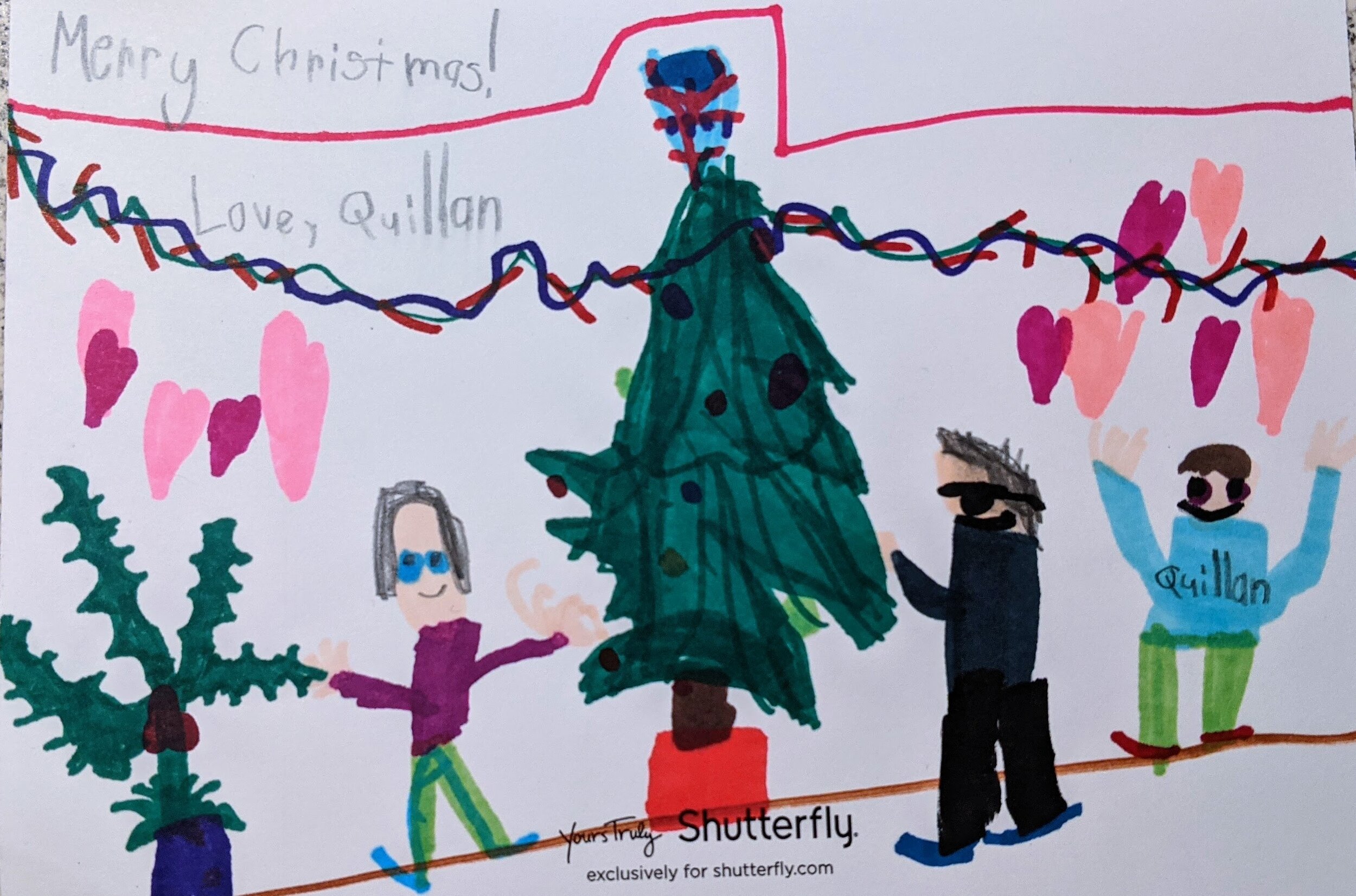Sunday Song Day: "Weight of Lies", Lifestyle & America's Health Expenditures, Ants, Kindergartner Cheer through COVID Christmas
When I started 2020, I was freshly 37, I’d just dumped my bread-winning career to go work at a greenhouse and get more time with Q, and a nerd about numbers I thought, “This is a prime year! Maybe this is going to be the year (after 5) we finally get another Cappello in this house!”
Well, COVID came, necessary lay-offs came, and many tear-filled moons have passed with nary an additional Cappello, the most recent bodily howl clanging its crampy cacophony as my business partner and I unloaded zero-waste containers in sub-freezing temps, and then chugged along cleaning/cooking for several hours.
Any and all of the above would've been enough for Old J to've crawled into the deep cover of comfortable depression (and pain) and wail, but the mantra and mindset of this year has been to take a breath and refocus on steps forward and the present gifts to be grateful for.
Thanks to transitioning this family to plant-based (mostly) whole-foods we’ve never been healthier (<—essential in a pandemic), that transition sparked up Crystal to try the same, it lit up the health of all of her kin too, dazzled by our own results (+ a year-and-counting of nutritional research) we decided to take our cooking-skills/environmental-passion and give our community access to plant-based whole-food (zero-waste) feasting, we sold out shockingly fast, and as I found myself watching our sons fill the air with laughter and snowballs: I thought how grateful I am to have all these dear souls here in the present filling up our lives with love.
Years and mindsets are what you make of them. ♥️
Continue for: Sunday Song Day (“Weight of Lies” Avett Brothers) + the Balance of Gratitude through Frazzle; American College of Lifestyle Medicine (again) and how it ties into America’s health expenditures; Q’s theme of the week (ants); more holiday cheer (the sort of cards a kindergarten kiddo sends in COVID times when he’s missing loved souls); and some examples of what this family is feasting on.
Live Kindly, Feast Kindly, Grow Forward.
Crystal in front of our first pallet of zero-waste containers. When we sold-out, we had to shut down the site quickly because we had doubled our aim, which meant for quite the interesting scramble to find more containers within the last two (busiest shipping/shopping) weeks of the year!
We pick up the other (denser, because they are a different brand) two-thirds of our containers this Tuesday. 😱😅
And because this week has involved some stressful scrambling, it also meant that we had some meals that weren’t whole-food or from scratch. It happens! ♥️
Here seen: I braised some green beans and beyond burgers in aminos with paprika, garlic, turmeric, and black pepper.
Why should you be eating turmeric and why you want to pair it with black pepper:
Turmeric is full of a active compound known as curcumin, and research indicates that curcumin may lower inflammation and improve systemic markers of oxidative stress. “In fact, it’s so powerful that it matches the effectiveness of some anti-inflammatory drugs, without the side effects ( 9 ).”
However, curcumin in turmeric is poorly absorbed into the bloodstream, but research has shown that combining the piperine in black pepper with the curcumin in turmeric enhances curcumin absorption by up to 2,000% (2, 7, 8).
This day would have been Threat-Level Phish Food Ice Cream for my old self. Emotional eating isn’t recommended, but if that is you (as it is me and most of the souls I love <—with the exception of Ian who is the healthiest dang eater I’ve ever known), then try swapping out what would be a high-inflammatory (cardiovascular damaging) meal, and substitute something that tastes just as decadent but fills your system with antioxidants, iron, the Vitamin C to absorb that iron, omegas, and the beneficial/essential fiber that will fill you back up with health and light.
Here seen “Breakfast for Dinner”: black bean brownies (<—plant-based whole-food), almond butter, apple, banana, Omega Sprinkle (+ chia), and a little 30-Second Chocolate Sauce.
I post mainly Pollyanna positivity beams because given the scope of calamities across the globe we are fully cognizant of how lucky we are, but that does not negate the fact that some days are chock-full of LIFE.
I am an introvert happiest/calmest tending plants, but my mission is to help my community lessen its environmental footprint & better its health, because we are running out of time to help both, and no one else was stepping up to the plate.
This means I am operating outside of my comfort-zone daily, while simultaneously learning how to start/operate a business-from-scratch (which double-sold-out in the holiday weeks, so we’re now in a race for more materials in the absolute worst time of the year) and homeschooling a precocious kindergartner. My mental cup spilleth’d over several weeks ago 😅, and every day since has been deep breaths, treading through each new business to-do, with arms perpetually pulling the tether of “focus” to my airy/atmospheric dreamer who is somehow also a hovering cloud of Mama Boy cling.
So, in the spirit of Avett Brothers “Weight of Lies” (which has been in my head all week), lest you think this realm is void of struggle: we all have a swirl and spectrum of background stress. And, lest you think everything is sunshine and roses over here: we have days where the only light to be found is that the next one will be better.
“I once heard the worse thing a man can do is draw a hungry crowd
Tell everyone his name in pride and confidence
But leaving out his doubts
I'm not sure I bought those words
When I was young I knew most everything
These words have never meant as much to anyone
As they now mean to me”
Q: What is ACLM and what does it do?
A: The American College of Lifestyle Medicine (ACLM) is the medical professional society for physicians, nurses, allied health professionals, health care executives, medical students, medical residents and others on the health care team devoted to treating, reversing and preventing chronic disease through lifestyle behaviors as a first-treatment option. ACLM fills the existing void in medical education by equipping and empowering its members to practice evidence-based Lifestyle Medicine through live and online CME-accredited events and educational offerings, certification opportunities, clinical practice and reimbursement tools, patient education resources, networking opportunities and advocacy.
Q: Why is this important and why now?
A: Chronic disease is the leading cause of death and disability in the U.S. Rates of chronic disease have never been higher, with cost of chronic conditions eating up 86% of all healthcare dollars spent. Chronic disease is so common that more than half of U.S. adults have at least one condition, accounting for 90% of healthcare spending.
According to the World Health Organization, 80% of heart disease, stroke and type 2 diabetes and 40% of cancer could be prevented, primarily with improvements to diet and lifestyle.
The U.S. spends at least 18% of its GDP ($3.35 trillion) on health expenditures. If costs continue to rise, by 2050 Medicare and Medicaid alone will account for 20% of the GDP. All projections point to continued rises in chronic disease. If we don’t reverse this trend, we are headed for bankruptcy as a country. The solvency of our nation is at state.
Q: What can be done about this?
A: Lifestyle Medicine is an evidence-based approach shown to prevent and treat disease. It treats the underlying cause of disease rather than its symptoms that are too often addressed with ever increasing quantities of pills and procedures. Because it treats cause and not just symptoms, only through Lifestyle Medicine can we alter the course of spiraling health care costs.
There is a podcast interview with Dr Kim Williams* titled “The Food We Eat Is Killing Us” and I’ll be recommending it over and over again as long as I have breath, because you have one of our best cardiologists explaining to you in highly-scientific/yet-down-to-earth detail exactly how we have learned that animal products are harming our cardiovascular system, but he also goes on to explain how the radius of cardiovascular disease is hemorrhaging our health care system and how we as a populace/country could DO SOMETHING about this (<—by transitioning to plant-based feasting) before we bankrupt our whole system with preventable sickness. (<—-And Plant-Based feasting is essential for our sustainable future and is compassionate! Win, Win, Win!)
*Who is Dr. Kim Williams?
Born and trained in Chicago, Dr Williams was a professional level tennis player and coach before choosing rather to pursue a career in cardiology. Since 2013, he has headed up the cardiology department of Rush University Medical Center – where many of his colleagues have also found their way to adopting a plant-based diet.
Dr Williams has served on numerous committees and boards at the United States national level, including – but certainly not limited to – the American Society of Nuclear Cardiology, the American Heart Association, and the American Medical Association. Among other presidencies throughout his distinguished career, Dr Williams was the 2016 President of American College of Cardiology. Kim is also on the ‘International Advisory Council’ for Doctors For Nutrition – a wonderful Australian organisation dedicated to helping equip healthcare practitioners, institutions and the public with evidence-based information and education on optimum human nutrition.
Plant-Based Whole-Food Breakfast: black bean brownies, crunchy nut butter, and apple.
Plant-Based Whole-Food Dinner: whole-grain black rice, garlicky broccoli, easy avocado, turmeric/black-pepper pumfu, ruby kraut, and we topped it with the sugar-free peanut sauce.
Homeschooling Highlight: you get to pick your own PE path. :-)
While the district kids had a snow day, he had his regular school day but we also roamed around the forest for a bit.
<3
Q’s self-chosen theme of the week. :-)
Things I never knew: “Ants use their own acid to disinfect themselves and their stomachs. A team has found that formic acid kills harmful bacteria in the animal's food, thereby reducing the risk of disease. At the same time, the acid significantly influences the ant's intestinal flora.”
Fun math tie-in: had him build a thousand with his math manipulatives and then discussed the scope of 300,000
He has a workbook (seen below) that he works out of, but he was always asking for more/harder math so half his journal is filled up with equations (also solved via his math blocks)…and I guess a Queen Xenomorph for good measure. :-D
Homeschooling Highlight: when your marginal doodles are celebrated (and also factored into the day <—art is his biggest joy.)
And ELA and Art class are what you make of it. :-)
Each year he helps out with Christmas Cards in one way or another. This year we had far less to do (we had to cut back due to time and expense <—Double Containers!😱😱😅), but he drew pictures and short messages on a few of the cards, and was lit up to do so by this sweet card he received from Aria.
Q - “I’m putting it right here, because every time I look at it, it makes me happy.”
“She already knows how much I love her, so I’m going to draw her an elephant —because she loves them— and an octopus, because I think it will make her smile!”
Every time we pass the Smorol home, Q pipes up wistfully from the backseat, “I sure can’t wait for COVID to be over. I miss the Smorols.” Q is lucky to have a Papa who loves to wrestle with him daily, but there’s nothing quite like rolling around with your own pack of beloved friends and he loves Kelly like a second mother. It’s disorienting to have folks you love so close, and yet be kept at bay, and it tugged at my heart a bit how much Q showed himself hugging and hanging out with loved ones he misses.
Grandma and Grandpa <3
Grandma! 😂
What’s the most impactful thing you can do as an individual to help your kin, community, millions of species, and planet? Transition as plant-based as possible.🌎♥️
Why? Plant-Based foods are environmentally imperative 🌎. They also promote ideal health💪 (which takes stress off our overburdened health care system), are inexpensive🙌, delicious🤤, & compassionate. 💕
Why imperative, though? 🤔We’re approaching (& have crossed) climate tipping points that will doom our kin & millions of other species. 😱📣Reducing/eliminating animal products is the *most impactful thing an individual can do* to prevent worse. 🌎🔥
Why? Animal Agriculture creates more emissions than the entire transportation sector combined, it’s tied to water waste/loss/pollution (<-- freshwater is our most precious resource💧), land loss/deforestation (<-- exacerbates climate change by reducing our ability to sequester carbon🔥🌎), ocean acidification (<-- FYI 50-85% of earth’s oxygen originates from oceanic plankton🌊) & vast species loss/extinction/suffering💔📣🌎
Plus, consuming animal products is tied to increased risk of cardiovascular disease❤️🩹, diabetes👎, cancer👎, and chronic disease👎; whereas Plant-Based feasting is linked to preventing/reversing some of our most common diseases (<— like cardiovascular disease, diabetes, and cancer); plus it promotes ideal health & robust strength (ie Olympians, Weightlifters, Endurance Athletes are thriving via PBWFs too). 🎉🙌♥️
What organizations are promoting plant-based diets for best health and environmental stability? National Institutes of Health, Mayo Clinic, Yale, the United Nations, Harvard School of Health, American Heart Association, American College of Cardiology, American Cancer Society, American Diabetes Association, The American Academy of Pediatrics, National Kidney Foundation, even the Parkinson’s Foundation.
We’re all overwhelmed in one way or another, but for the sake of our kin (and the millions of species we share this planet with) we need to start pivoting forward. As someone who once rarely ate green things & used to eat animal products at every meal, I can assure you that is possible, affordable, enjoyable, & purposeful to pivot Plant-Based. In fact, our whole family is now healthier/stronger than ever. 🙌♥️
Anecdotally, our son had failure-to-thrive, was also plagued with perpetual ear-infections/sinus-infections, and had an omnipresent runny nose. What was he eating? Grass-fed milk, organic/antibiotic-free/grass-fed/local meats, eggs from organic-fed/well-loved chickens from a neighbor, every meal came with vegetables, and we limited junkfood. He was healed via a plant-based diet: he’s launched out of that diagnosis and the last time he had a sinus-infection (or was sick at all) was in 2019 when he had some cheese at a school Christmas party. Before shifting to PBWF’s he was sick every month, and how he’s a robust, vital, thriving kiddo. 🙌🎉♥️
If you think any of the above sounds over-reached/absurd/impossible, please go read the links above. I understand the inclination to hackle-raise (<—because I was once totally there) but the science is clear: any step we make forward is imperative (<—and again “STEPS” is the focus. Don’t leap, just start making steps!). It’s as simple as starting with one meal a week and growing from there.💕
We have the ability (deliciously, healthfully, kindly, inexpensively) to *preserve/protect* the planet we share with millions of species & our kin. How are we going to use that power today?✌️🤟🖖



























